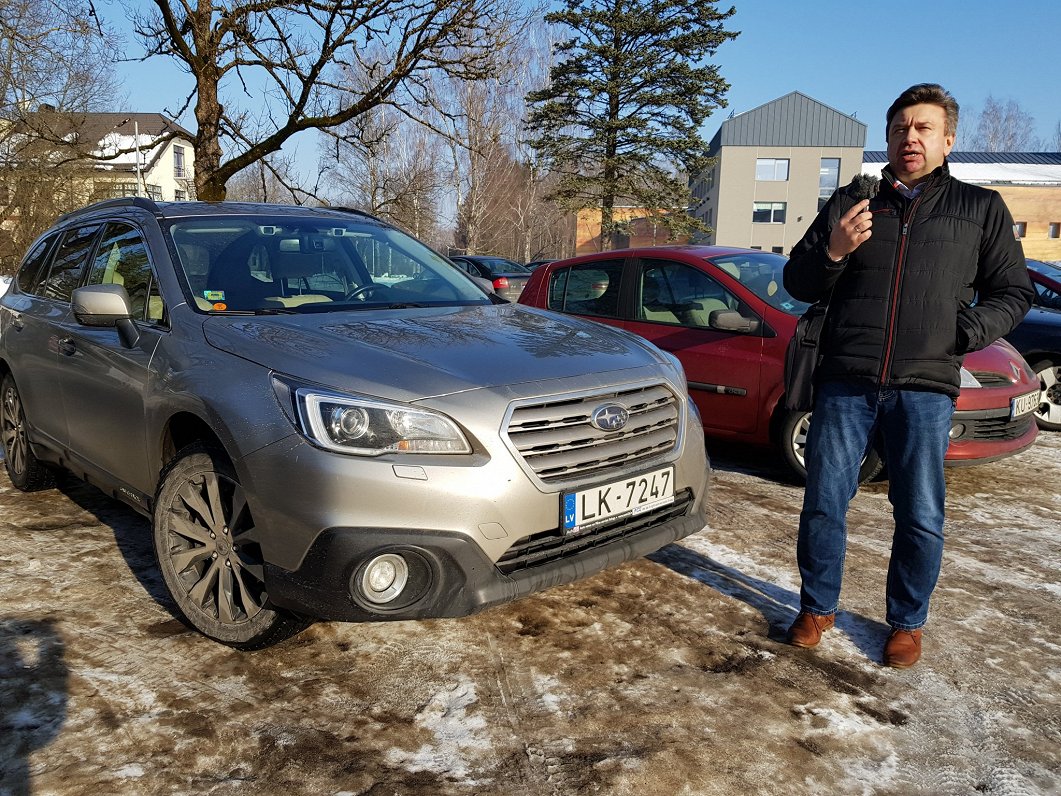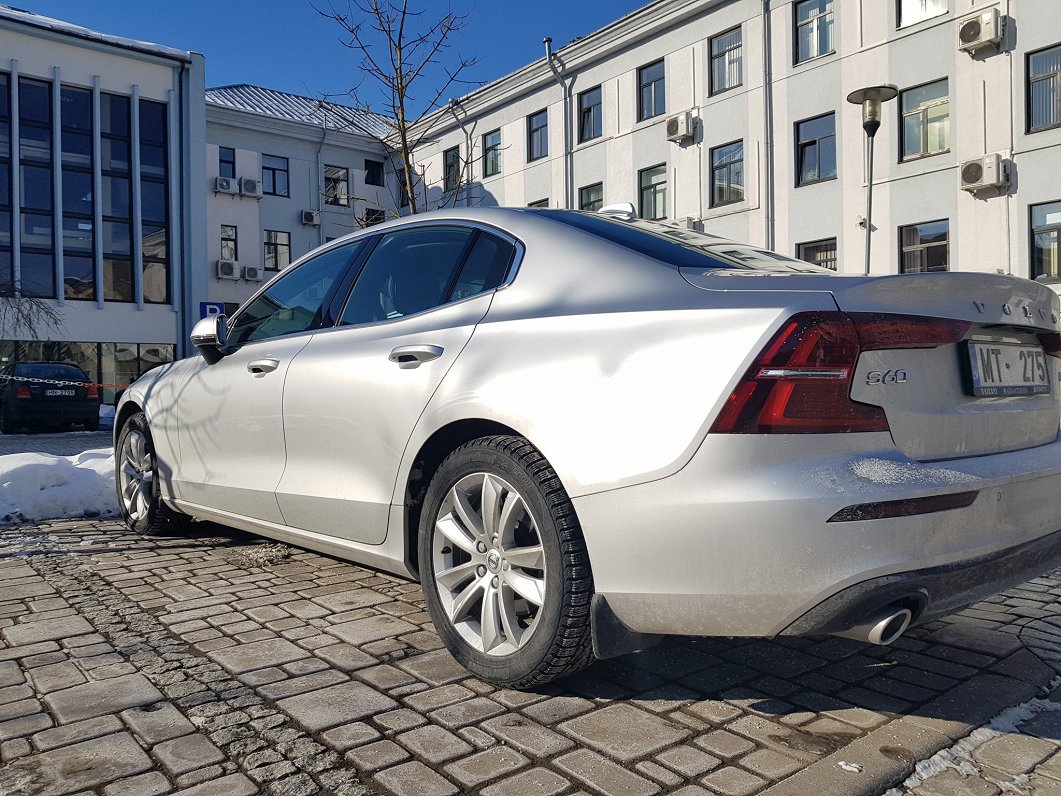As previously reported by LSM, Kupčs has in the past detailed highly questionable practices in a tender for Ogre municipal vehicles that seemed to rule out everything but high-line luxury models with a lengthy range of optional extras, and has now applied the same analysis to several other municipalities.
In Jelgava the reporter discovered a tender that made it clear the mayor and his deputies were looking not for an average runaround to get them from meeting to meeting but vehicles that must have a metallic silver body, leather interior and at least 19-inch wheels.
"In the middle of the working day, immediately after noon, a new Volvo S60 silver car arrives in the yard of Jelgava City Council building. Jurijs Strods (National Alliance), one of the two vice mayors of Jelgava, is sitting at the wheel. The car is parked in a parking lot specially marked for him, but, noticing the approaching correspondent of Latvian Radio, the deputy mayor thinks about getting out, starts the vehicle and leaves the parking lot," recalls Kupčs.
Meanwhile Mayor Andris Rāviņš' (Greens and Farmers Union) liking for Volvo cars can be called traditional. The newspaper "Zemgales Ziņas" during the economic crisis more than ten years ago reported that Jelgava City Council provides new vehicles with quite specific requirements. At that time, Rāviņš definitely wanted a light brown metallic car with wood and leather upholstery, all seats heated, air filter in the cabin, at least 300 horsepower and 25 more requirements.
He ended up with a car that was less powerful than the extreme 300hp requirement, and in red. Although the council rented the car for a couple of years, later the council's inclusion of an eight-year rust warranty paid off because finding a buyer for the car was extremely easy: at the end of the municipal contract, the little-used Volvo was bought by the mayor for personal use. The supervisory authorities did not find anything suspicious at that time.
These days, despite representing the Greens and Farmers' Union, his wheels are not of the rechargeable electric variety. Rāviņš retains his brand loyalty by drving a top of the range Volvo S90, also provided by the municipality and for which the requirements included ventilated front seats, full leather interior, all-wheel drive, at least 19-inch wheels, and no fewer than seven airbags.
Subarus for Sigulda
If Volvo is the brand of choice in Jelgava, sporty Subaru is the favorite in Sigulda.
Interested in Sigulda City Council's car rental procurement, in which the winner "Auto 26" delivered a Subaru Latvijas Radio called the Chairman of Sigulda County Council Uģis Mitrevics ("Regional Alliance"). Asked if this car in question was for the mayor himself or some other municipal employee, Mitrevics replied: “It's hard to say. We have about four Subaru cars. ” He also drives a Subaru himself.
Aivis Liepiņš, Head of the Transport Department of Sigulda Municipality, told Latvian Radio the tender demand for an SUV with a beige body color -- an unusual option that adds considerably to the price and would usually make the car harder to re-sell -- helps hide the dirt. In direct contrast, a light leather interior is "because the leather is easy to care for in the first place, but with light leather it's easier to see right away when the interior is dirty, so it's easier to clean and tidy right away." so the bodywork is to hide the dirt and the interior is to show it.

Despite this, the car is washed at least once a week, admitted the municipality. The rental for the car over five years will cost 39,000 euros. Sigulda could have saved more than two and a half thousand euros, if it had not wanted a beige body, because the second-placed tenderer offered a similar model in gray at a lower price. But this way at least Sigulda residents will not have to suffer the embarassment of seeing a municipal car with up to six days' worth of dust on it.
"In future procurements, we have abandoned any definition of tones. Certain specifications are more expensive, yes," Liepiņš admitted.
The examples of Sigulda and Jelgava vividly show how taxpayers' money is being wasted on over-specified vehicle procurement processes that seem tailored more to personal preference than value for money or straightforward utility.
A study by Latvijas Radio shows that several other municipalities have similar practices. Dundaga municipality has just got a white off-road vehicle (which will definitely show the mud), Ķegums municipality has very specific requirements for car purchases, Mazsalaca municipality has definitely ordered a brown car, but Ogre municipality has stopped a very detailed tender for the purchase of off-road vehicles after questions from the supervisory authorities.
"Unfortunately, it must be concluded that it is clear from practice and historical competitions - the further away the city is, the stranger the competitions are or the more specifically written," Kulbergs said. "Do we really have to try to fool people? Just say it straight - I want it so I buy it! It is a mentality and culture that has been with us since the Soviet era," says Andris Kulbergs, automotive industry expert and president of the Auto Association.
Kulbergs explained that one of the most restrictive requirements is the length such tenders are given to run. A delivery time of at least six months would ensure lower prices and undistorted competition, but in the case of Jelgava for example, the process took less than two months, which suggests tenders may be written with certain cars in mind rather than a range of possible cars being found to match the demands of as broad and flexible a list of requirements as possible, which should in turn increase competition and ensure taxpayers get better value for money.
The Competition Council last conducted a study on car procurement five years ago. At the time, some dealers complained about the tender requirements. But now the market is at peace, says Ieva Šmite, director of the Competition Council's Prohibited Agreements Department.
"Outside Riga municipalities, there are criteria for more local procurement, which reduces the number of suppliers," she admitted, "such requirements are set as the size of the tires, the type of fuel, the color of the car or the type of gearbox. These are not objective criteria, but they narrow the range of suppliers."
Šmite says that soon the Competition Council will study the car procurement market again.
Head of the Procurement Monitoring Bureau Artis Lapiņš told Latvian Radio that the number of car tenders has halved during the Covid-19 pandemic, but some localities were quick to find a way not to announce them at all if spending up to ten thousand euros. Lapiņš believes that the desire of local government leaders to have a nice car should be assessed by voters, not by supervisors. But he promises to start catching suspicious purchases.
"We will base our approach on an analysis of how purchases have taken place. If in the end the consequence is that one supplier dominates, we will pay attention. We are currently working on risk analysis solutions to weed out customers who have a systemic problem in order to pay more attention to them,” said Lapiņš.
























